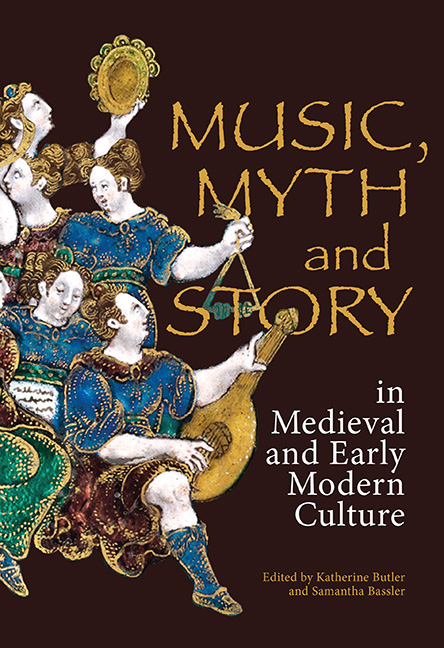Book contents
- Frontmatter
- Contents
- List of Illustrations
- List of Contributors
- Editors’ Note
- Introduction
- I MYTH IN MEDIEVAL MUSIC THEORY AND PHILOSOPHY
- II ICONOLOGIES OF MUSIC AND MYTH
- III MYTHS IN RENAISSANCE PHILOSOPHIES OF MUSIC
- IV MYTH AND MUSICAL PRACTICE
- V NARRATIVES OF PERFORMANCE
- VI MYTH AND MUSIC AS FORMS OF KNOWLEDGE
- 12 ‘Fantastic Spirits’: Myth and Satire in the Ayres of Thomas Weelkes
- 13 Feeling Fallen: A Re-telling of the Biblical Myth of the Fall in a Musical Adaptation of Marvell's ‘A Dialogue between Thyrsis and Dorinda’
- VII RE-IMAGINING MYTHS AND STORIES FOR THE STAGE
- Bibliography
- Index
- Studies in Medieval and Renaissance Music
13 - Feeling Fallen: A Re-telling of the Biblical Myth of the Fall in a Musical Adaptation of Marvell's ‘A Dialogue between Thyrsis and Dorinda’
from VI - MYTH AND MUSIC AS FORMS OF KNOWLEDGE
Published online by Cambridge University Press: 24 October 2019
- Frontmatter
- Contents
- List of Illustrations
- List of Contributors
- Editors’ Note
- Introduction
- I MYTH IN MEDIEVAL MUSIC THEORY AND PHILOSOPHY
- II ICONOLOGIES OF MUSIC AND MYTH
- III MYTHS IN RENAISSANCE PHILOSOPHIES OF MUSIC
- IV MYTH AND MUSICAL PRACTICE
- V NARRATIVES OF PERFORMANCE
- VI MYTH AND MUSIC AS FORMS OF KNOWLEDGE
- 12 ‘Fantastic Spirits’: Myth and Satire in the Ayres of Thomas Weelkes
- 13 Feeling Fallen: A Re-telling of the Biblical Myth of the Fall in a Musical Adaptation of Marvell's ‘A Dialogue between Thyrsis and Dorinda’
- VII RE-IMAGINING MYTHS AND STORIES FOR THE STAGE
- Bibliography
- Index
- Studies in Medieval and Renaissance Music
Summary
MYTH and story are forms of communicated knowledge that find their origin in an oral tradition later committed to written word. As such, biblical myths might function as kinds of history, reflecting man's understanding of human experience and his struggles to grasp what it means to be human. The most familiar of these biblical stories is that of the Creation, the serpent's seduction of Adam and Eve, and their consequent banishment from the Garden of Eden for disobeying God's mandate, which offers an explanation for human mortality. The poetic adaptation of this myth with which most modern readers are acquainted is John Milton's Paradise Lost. The latter part of the story recounts Adam and Eve's consciousness of their fall from God's grace to a state of sin in which the hope of re-capturing the Edenic bliss they once lived seems impossible. Andrew Marvell's poem ‘A Dialogue between Thyrsis and Dorinda’ also captures that consciousness of the effects of such a state of sin.
The exact date of composition of Marvell's ‘Dialogue’ is difficult to determine, but occurred before William Lawes set the poem to music preceding his death in 1645. The poem circulated in later manuscripts, of which there are several extant copies, and then appeared in Marvell's posthumously published Miscellaneous Poems (1681). In the poem, Adam and Eve are recast as the shepherd Thyrsis and the shepherdess Dorinda, who discuss the nature of heaven. Thyrsis's attempt to explain it in the idyllic terms of a pastoral frame only causes Dorinda to express her despair arising from her sense that redemption from their fallen state on earth is beyond their grasp. Matthew Locke adapted the poem to be sung as a musical dialogue. Locke's musical adaptation of ‘A Dialogue between Thyrsis and Dorinda’ was included as an example of the pastoral dialogue in John Gamble's Ayres and Dialogues (1659), as well as in John Playford's Choice Ayres (1675) and Theater of Music (1687), and Henry Playford's New Treasury of Music (1695). Transcriptions of Locke's musical setting also circulated in manuscript.
Marvell's ‘Dialogue’ itself suggests the reason why the reception of such myths as the Fall of Man proved problematic in a contemporaneous climate of emerging philosophical inquiry.
- Type
- Chapter
- Information
- Music, Myth and Story in Medieval and Early Modern Culture , pp. 224 - 238Publisher: Boydell & BrewerPrint publication year: 2019



